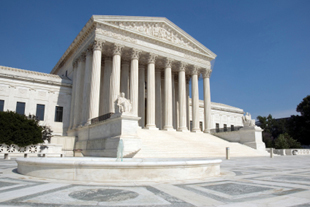
WASHINGTON (BP) — The U.S. Supreme Court announced Monday that it would review in March the constitutionality of President Obama’s landmark national health care law, setting aside five and a half hours of oral arguments in what promises to be a dramatic moment not only in the nation’s history but in the 2012 presidential race.
 From the moment Obama signed the Patient Protection and Affordable Care Act into law in March 2010, it has remained controversial. Pro-lifers opposed it because the law, they said, broke new ground by allowing tax dollars to subsidize insurance plans that cover abortion. Other opponents of the law have focused on the law’s requirement that all individuals must purchase a health care plan — an “individual mandate” requirement that violates the U.S. Constitution’s Commerce Clause, they say.
From the moment Obama signed the Patient Protection and Affordable Care Act into law in March 2010, it has remained controversial. Pro-lifers opposed it because the law, they said, broke new ground by allowing tax dollars to subsidize insurance plans that cover abortion. Other opponents of the law have focused on the law’s requirement that all individuals must purchase a health care plan — an “individual mandate” requirement that violates the U.S. Constitution’s Commerce Clause, they say.
Although some of the law has gone into effect, much of it, including the individual mandate, has not. The individual mandate is set to take effect Jan. 1, 2014, with all of the law scheduled to be in effect by 2015.
Appeals courts have split on the issue of the law’s constitutionality.
The Commerce Clause, found in Section 8 of the Constitution, says Congress has the power to “regulate Commerce” among the states. Its meaning has been a source of much debate between conservative and liberal attorneys. The health care cases involve a debate as old as the country itself: the extent of the federal government’s power over the states.
Opponents call the law “Obamacare.”
Among the questions that the court agreed to consider:
— Is the individual mandate constitutional?
— If the individual mandate is struck down, can the rest of the law remain standing — as the 11th Circuit Court of Appeals allowed in severing it from the broader law?
— Can opponents, under a law known as the Anti-Injunction Act, even file suit until the health care law is fully in effect? That act prevents lawsuits against taxes from going forward until the tax itself goes into effect.
Experts on both sides of the debate say that without the individual mandate, the heath care law may not survive financially.
The Supreme Court could issue a ruling on the case in June — five months before the general election.
The White House said it was pleased the court would hear the case and that it remained confident Obama’s crowning achievement would be upheld.
“Thanks to the Affordable Care Act, one million more young Americans have health insurance, women are getting mammograms and preventive services without paying an extra penny out of their own pocket and insurance companies have to spend more of your premiums on health care instead of advertising and bonuses,” the White House statement said. “We know the Affordable Care Act is constitutional and are confident the Supreme Court will agree.”
The lawsuits were brought by Florida and 25 other states, and by the National Federation of Independent Business, a small business association. Ironically, both the White House and the law’s opponents wanted the Supreme Court to hear the case. The fact that the White House wanted the case heard quickly was an acknowledgement that if Obama loses in 2012, a Republican administration might not defend the law at all.
Florida Attorney General Pam Bondi applauded the court’s action. Florida is the named plaintiff in one of the cases.
“Throughout this case, we have urged swift judicial resolution because of the unprecedented threat that the individual mandate poses to the liberty of Americans simply because they live in this country,” Bondi said. “We are hopeful that by June 2012 we will have a decision that protects Americans’ and individuals’ liberties and limits the federal government’s power. We look forward to presenting oral argument and defending our position that the individual mandate is unconstitutional, that the entire law fails if one part fails, that the Anti-Injunction Act does not apply, and that Medicaid’s expansion is unlawfully coercive.”
The entire law must be struck down for it to solve the concerns of pro-lifers. Prior to Obama signing the law, the federal government was prohibited from funding insurance plans covering abortions. That changed with the new law. The law’s supporters argue that even under the health care law, no tax dollars will go toward abortions because it requires that anyone who has a plan that covers abortion — even a man or elderly woman — must pay a separate fee for abortion coverage. Although that is technically true, pro-lifers say, the new law could lead to more abortions by increasing the number of poor and middle class women who have abortion coverage in their health care plans. Those women will be able to afford insurance plans that cover abortion, those pro-lifers say, solely because of the federal subsidies. During debate on the bill in 2010, pro-lifers tried but failed to amend the bill to prohibit any elective abortion coverage in plans.
Pro-lifers are opposed to other aspects of the law. For instance, earlier this year the Obama administration announced that, under the law, insurance plans must cover, without cost to women, contraceptives that can cause abortions. Such contraceptives are “ella,” Plan B and Next Choice. The services will be required in insurance policies that begin their plan years Aug. 1, 2012, or thereafter.
Southern Baptist ethicist Richard Land has called for a total repeal of the law and for “its replacement with the health-care reform that we truly need.”
The Southern Baptist Convention’s Ethics & Religious Liberty Commission supports “health care reform that would preserve the private nature of our health care system while reducing costs, maintaining the highest possible standard of care, and ensuring that federal dollars are not used to subsidize abortion,” Land previously wrote. “Unfortunately, the [health-care reform] enacted last year fall[s] well short of these ideals.”
The American Center for Law and Justice, which represented more than 100 House members in asking the court to take up the case, applauded the court’s action. The House members, ACLJ wrote in its request to the Supreme Court, believe that “the Constitution does not empower Congress to require Americans to purchase and maintain Federal Government-approved health insurance from a private company for the rest of their lives or pay an annual penalty.”
The other 25 states involved in the case are Alabama, Alaska, Arizona, Colorado, Georgia, Idaho, Indiana, Iowa, Kansas, Louisiana, Maine, Michigan, Mississippi, Nebraska, Nevada, North Dakota, Ohio, Pennsylvania, South Carolina, South Dakota, Texas, Utah, Washington, Wisconsin and Wyoming.
–30–
Michael Foust is associate editor of Baptist Press. Get Baptist Press headlines and breaking news on Twitter(@BaptistPress), Facebook (Facebook.com/BaptistPress) and in your email (baptistpress.com/SubscribeBP.asp).
















